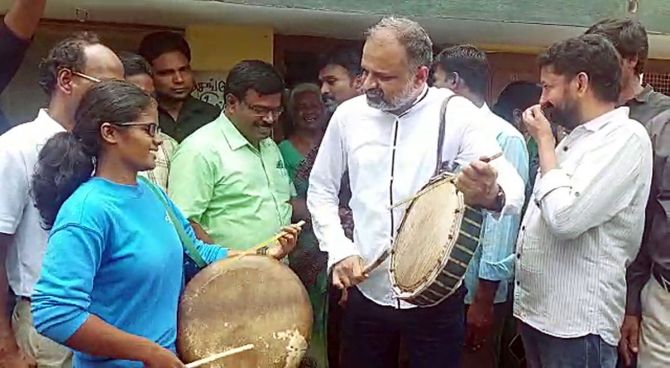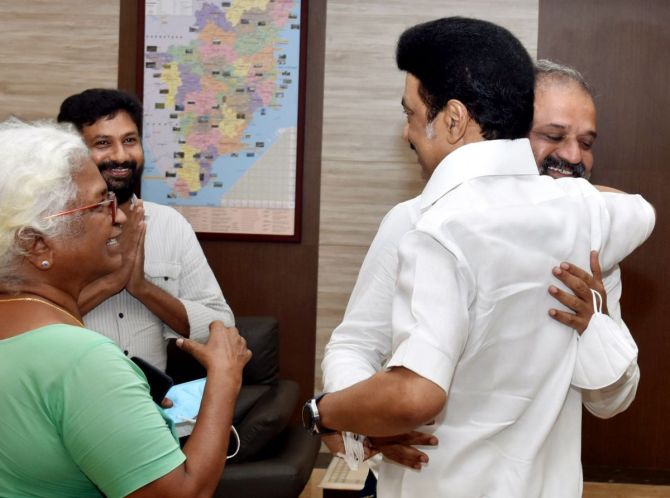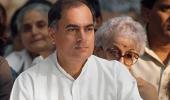The Rajiv Gandhi assassination, investigation and trial were all jinxed in parts, recalls N Sathiya Moorthy.

At the end of it all, the Supreme Court did free A G Perarivalan alias Arivu, one of the seven convicts in the Rajiv Gandhi assassination case.
The six co-accused, including accused Non 1 Nalini too, may now be allowed to walk free, based on the verdict.
Celebrations over Perarivalan's freedom since Wednesday's Supreme Court verdict is in order as far as he, his mother Arputhammal, family members and relatives are concerned.
The mother, through her belief in her son, grit and determination, has lent meaning to her name.
She has simply staged a 'miracle' as the phrase arputham in her name suggests in the Tamil language.
The celebrations are bound to extend to others awaiting freedom.
Especially there will be more to know about the future plans of Nalini, an Indian citizen, her husband Sriharan alias Murugan, a Sri Lankan who has taken to religion in a big way while in prison, and their married daughter, Harithra or Athirai, born in prison, and living overseas with her father's kin.
The euphoria should end there -- or, should it double for the survivors? -- as three of the four death row convicts barring Nalini should have been executed long ago once all the courts had disposed of the original Rajiv Gandhi assassination case, review petitions, et al, and the Constitutional authorities too had declined their mercy petitions.
If Murugan, Perarivalan and Santhan are still alive and around, it owes mainly to the unprecedented lethargy of the nation's administrative machinery, as unlike in other cases of the ilk, the execution of the convicts took its own sweet time -- in non-execution of the order, that is.
With the result, they argued, and the judiciary, going up to the Supreme Court, conceded the argument that they had been put through untold mental agony through years and decades, waiting for their death to arrive, that they deserved commutation of their death sentence in the first phase, and outright freedom, since.
Of course, rapid execution occurred in the case of other terrorism cases, which incidentally involved Pakistani ISI-backed killers.
In the Rajiv Gandhi case, the Supreme Court uniquely concluded that the LTTE assassination of a former prime minister did not aim at 'overawing the Indian State', as was required under the now defunct Terrorism and Disruptive Activities (Prevention) Act (TADA), under which the case was prosecuted.
This meant that the case reverted to the status of a simple murder case under the Indian Penal Code, punishable with death or life imprisonment under Section 302.
Which could also mean that all those death row convicts and life term commutees across the country could plead with the Supreme Court to invoke its extraordinary powers under Article 142 and free them, too.
Yet, from the victim's standpoint, 'justice delayed is justice denied'.
The list of victims does not stop with Rajiv Gandhi, but also 15 others, including his SPG bodyguards and Tamil Nadu police officials who lost their lives, and many others who sustained grievous injuries.
According to the family members of some of the victims, freedom for Perarivalan has now put that judicial maxim on its head.
The maxim has been interpreted to grant freedom to those that should have been made to pay a price for their crimes with their lives -- or, so goes the argument.
But there is ready agreement that the non-execution of the execution order against the three convicts after the then governor had commuted the sentence of Nalini, a young mother, at the instance of Rajiv's wife Sonia Gandhi, was unjustifiable even from the latter's standpoint.
The case of Nalini, who was the only one surviving from the core group of conspirators in India, and was made A-1, is a standalone affair.
She was made A-1 after the prosecution separated the case against the original A-1, LTTE boss Velupillai Prabhakaran, his intelligence chief Pottu Amman and women's wing leader Akila, as they were untraceable.
The Criminal Procedure Code provides for such separation of cases against those declared as 'absconders' by the case, at the instance of the prosecution, of course.
Sonia Gandhi's plea was that with father Murugan and mother Nalini both condemned to be executed, their daughter Harithria alias Athirai, born in the high-security Poonamalle prison in Tamil Nadu, would have been orphaned.
The Congress party, which has since criticised the Supreme Court for the Perarivalan verdict, should first explain under which provision of the Indian law did the governor derive his powers to commute Nalini's death sentence, on the plea of an extraneous third party.
Under Indian criminal jurisprudence, the State is the prosecutor and the State, whether the Centre or state governments, alone had the power to recommend both commutation and remission of sentences -- both of which benefits Perarivalan has since enjoyed.
But at no stage during the pendency of 'Perarivalan's freedom petition' did anyone, either inside the case or outside the courts, point to the Tamil Nadu governor using his powers to commute Nalini's death sentence without referring it to the President, as was done in the case of Perarivalan and the rest.
It is another matter that no one, including the families of the 15 other victims and/or the 40-plus survivors, including a serving police officer at the time, questioned the legality of the governor acting on Nalini's commutation plea, moved not by either her or her family but by a 'third party'.
If only that position had been presented properly, then may be the dichotomous argument about the powers of the governor vis-a-vis that of the President of India in such matters might not have arisen in the first place.
Today, after the Perarivalan case verdict, the perceived Constitutional tensions between the DMK state government of Chief Minister M K Stalin and Governor Ravindra Narayan Ravi should come to a smooth closure.
Already, after the Supreme Court had orally observed that the governor, under Article 161, had to act only on the aid and advice of the council of ministers headed by the chief minister, the Chennai Raj Bhavan promptly forwarded the twice-passed state bill on NEET exemption to the President, without sitting on it any more.

Long before the Chennai-Delhi ping-pong over the Rajiv killers' case began playing on multiple courts, comprising the Supreme Court and the Madras high court, Rashtrapati Bhavan and the Chennai Raj Bhavan, and also the governments at the Centre and in the State, the case had become problematic.
Once the Supreme Court Bench under Justice K T Thomas ruled that it was not a TADA case but only an 'IPC case', the commutation/remission arguments were to be confined to who is the prosecuting authority.
The Centre argued it was the CBI and the President alone could decide on commutation and remission.
Today, it's only a 'murder case', which was within the realm of the state government's powers under the Constitution.
The courts took their time and expended a lot of energy to put it in an enforceable judgment.
The Supreme Court had already ruled in the Indira Gandhi assassination case, the gubernatorial powers in terms of clemency and commutation and freedom were all 'objective', and not 'subjective.
This meant that the governor had to seek and/or act according to the advice of the state government.
For those who confuse the state government's enforceable recommendation under Article 161 with the two resolutions passed by the Tamil Nadu assembly, the latter did not have any Constitutional enforceability.
Even without it all, the assassination, investigation and trial were all jinxed in parts.
Mystery still surrounds the choice of the Sriperumpudur venue for Rajiv Gandhi's fatal rally, which post facto was considered unsuitable for someone under SPG cover.
As later investigations showed, intelligence agencies had overlooked decoding LTTE intercepts on preparations for the assassination.
During the course of the investigation, a witness committed suicide in CBI custody in his native Thanjavur.
The probe team also reportedly lost a suitcase with evidence material overseas.
Then, the killer-team got away from their Chennai hideout to Bangalore by hiding in a milk tanker, without the police getting wind of it.
Last but not the least, by delaying the capture of the main logistics-plotter Sivarasan or one-eyed Jack, and Subha, the back-up belt-bomber if Dhanu had failed, at their Konanakunte suburban home in Bangalore, the CBI-SIT might have lost valuable material.
Opinion, however, is divided if they would have allowed themselves to be captured, given the LTTE's 'cyanide-bottle' culture to commit suicide to avoid capture.
In the midst of all these, rather later, the Centre appointed what is the forgettable MDMA (Multi-Departmental Monitoring Agency) to collect further evidence, especially over Prabhakaran & Co.
Two, not just one, Commissions of Inquiry went into the assassination.
Of them, the report of the second one, under Justice Milap Chand Jain, contributed to the fall of Prime Minister I K Gujral's government after the Congress underwriter withdrew support, citing the DMK partner's alleged role in the assassination -- which has never been proved, even by the rival AIADMK government of J Jayalalithaa, then or since.
On the political side, the DMK faced its worst-ever electoral debacle since entering the electoral scene in 1957, when the party won just two of 234 assembly seats and not one of 39 Lok Sabha seats in Elections 1991.
For the only time ever, the DMK went without a single member in either House of Parliament, when for a period it did not have any members in the Rajya Sabha either.

In the current circumstances, so shoddy has been the way the Centre and its agencies handled the sensitivity attaching to the assassination and the court case that no one seemed to have been alive to the coincidence of the 'Perarivalan freedom verdict' being on May 18, the 13th anniversary of the end-game of Sri Lanka's ethnic war against the LTTE terror group, the brain behind the Rajiv Gandhi assassination.
As coincidence would further have it, Rajiv Gandhi's death anniversary itself falls three days later, on May 21.
With the result, the Perarivalan case became a cause for celebrations for pan-Tamil groups in Sri Lanka, India and elsewhere, just as it was also a day for remembering their beloved ones lost in the war, including innocents in their thousands, whom they claim the Sri Lankan troops had massacred at the final battleground in Mullivaikkal.
Whether or not the LTTE's idea was to 'overawe' the Indian State, the court-ordered freedom for Perarivalan, to be followed by those for Murugan and Santhan, both Sri Lankan nationals, and also Murugan's Indian wife Nalini have overjoyed pro-LTTE sections of the Sri Lankan Tamil community across the world.
This was apart from the revival of competitive politics between the ruling DMK and AIADMK in Tamil Nadu, where the latter in particular claimed credit for the Supreme Court verdict, pointing out how the late party chief minister Jayalalithaa had passed a cabinet resolution binding the state governor to decide on the matter under Articles 161-162.
It was different from one of very many orders passed by the Supreme Court in the assassination and its aftermath, tying the remission petitions to the President under Articles 431, instead.
Then there is the claim by a section of the pro-BJP social media that it was their way of rendering justice to the Tamil community, by respecting and following the due process of law.
The fact seems to be that traditional supporters of the ruling party at the Centre in Tamil Nadu, for once, are with their Congress rivals, who have openly condemned freedom for Perarivalan and the rest.
Ironically, by invoking the Supreme Court's extraordinary powers under Article 142, the Bench has obliterated the need for the governor to sit on judgement over the cabinet's recommendation.
It has rendered the state cabinet's recommendation infructuous, to say the least.
By implication, even without approaching the governor through the state cabinet, the convicts could have obtained the same court orders through the grit of their determination and persistence -- as Perarivalan has proved.
As the wag puts it, who knows then, the convicts might even sue the State for compensation for those extra days, rather months and years they were made to spend in prison, and damages for the anguish caused to them, as conceded by the Supreme Court while commuting their death sentence into one of life, very long ago.
On the streets, the average grey-haired Tamil who was a youth at the time of Rajiv Gandhi's assassination on May 21, 1991, is reminded of the famous line from thespian Sivaji Ganesan's 1973 super-hit Tamil movie Gauravam: 'If you hire Barrister Rajinikanth, you can commit a murder on Mount Road in broad daylight and go to watch a movie in the same neighbourhood.'
No harm would come to you -- or, that was the message of the film then -- and now from the shoddy way the Rajiv Gandhi assassination case was handled from beginning to end -- as long as the Centre does not find any reason to challenge the Perarivalan verdict through a 'review petition', which again would come up before the very same Bench!
N Sathiya Moorthy, veteran journalist and author, is a Chennai-based policy analyst and commentator.
Feature Presentation: Aslam Hunani/Rediff.com










